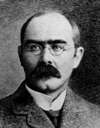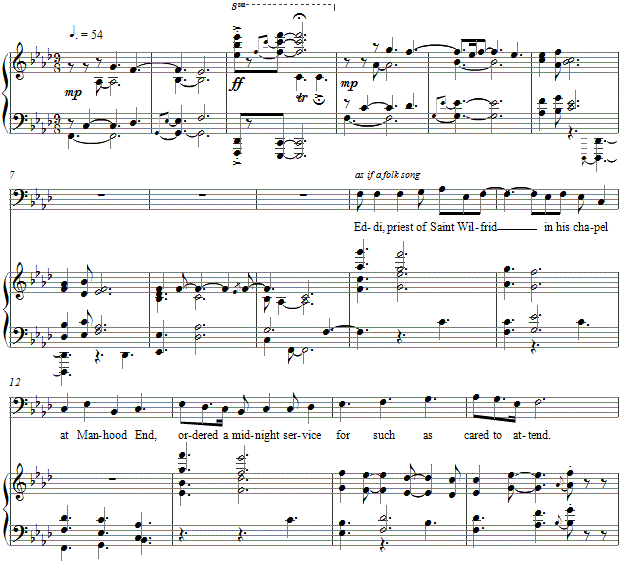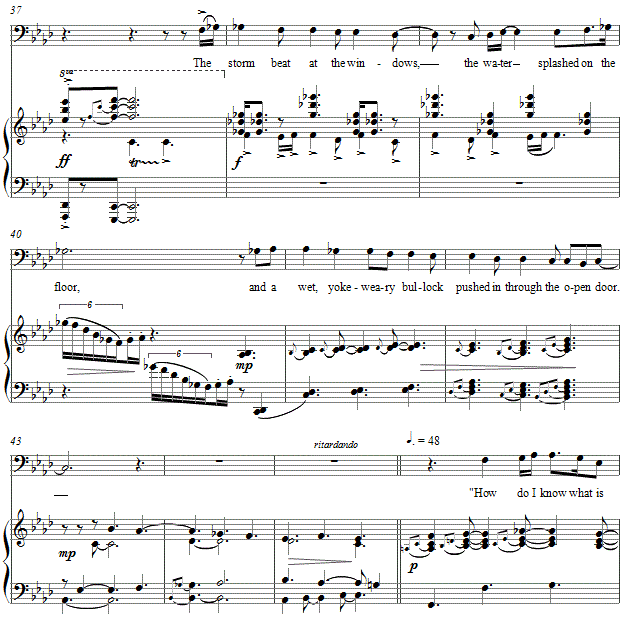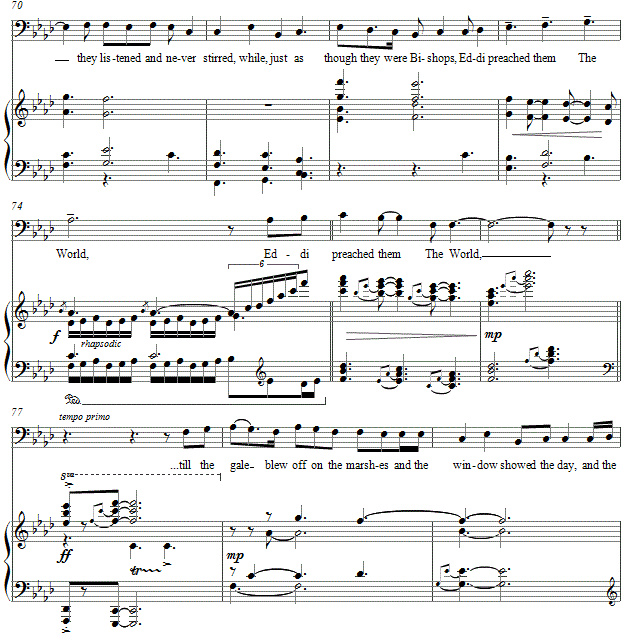Music and Texts of GARY BACHLUND
Vocal Music | Piano | Organ | Chamber Music | Orchestral | Articles and Commentary | Poems and Stories | Miscellany | FAQs
Eddi of Manhood End - (2011)
Rudyard Kipling
for bass and piano
for David Paul Anthony Mattinson
Eddi, priest of St. Wilfrid
In his chapel at Manhood End,
Ordered a midnight service
For such as cared to attend.
But the Saxons were keeping Christmas,
And the night was stormy as well.
Nobody came to service,
Though Eddi rang the bell.
"'Wicked weather for walking,"
Said Eddi of Manhood End.
"But I must go on with the service
For such as care to attend."
The altar-lamps were lighted, --
An old marsh-donkey came,
Bold as a guest invited,
And stared at the guttering flame.
The storm beat on at the windows,
The water splashed on the floor,
And a wet, yoke-weary bullock
Pushed in through the open door.
"How do I know what is greatest,
How do I know what is least?
That is My Father's business,"
Said Eddi, Wilfrid's priest.
"But -- three are gathered together --
Listen to me and attend.
I bring good news, my brethren!"
Said Eddi of Manhood End.
And he told the Ox of a Manger
And a Stall in Bethlehem,
And he spoke to the Ass of a Rider,
That rode to Jerusalem.
They steamed and dripped in the chancel,
They listened and never stirred,
While, just as though they were Bishops,
Eddi preached them The World,
Till the gale blew off on the marshes
And the windows showed the day,
And the Ox and the Ass together
Wheeled and clattered away.
And when the Saxons mocked him,
Said Eddi of Manhood End,
"I dare not shut His chapel
On such as care to attend."[ 6 pages, circa 6' 15" ]
Rudyard Kipling
The original title of Kipling's poem is "Eddi’s Service (AD 687)." The promontory of Manhood near Selsey to the south east of Chichester, originally referring to a "common wood," is site to the early stories of Saint Wilfrid, a Benedictine monk and bishop who founded a monastery in the area. The historian Bede calls him bishop of York, while others name different titles. Eddi was Eddius Stephanus, St Wilfrid’s chaplain and biographer, according to sources I have read. Wilfrid came to England to become Bishop of the South Saxons. This evocation by Kipling of the tells of an admirable constancy in the face of a sort of adversity, and of course of faith. The poem was introduced to me through correspondence with Brian Mattinson in his work with The Kipling Society of the UK, and it seemed apt for a musical setting, the dedication as noted above being to his son.
The opening gesture is among the themes for the setting, the third measure a stark interruption of lyricism, as if a lightning through a door ajar. The lyricism returns leading to the opening stanza of the poem, marked "as if a folk song." The 9/8 meter suggest groups of three, and the triplet of eighth notes, becomes a group of three quarters as at measure twelve, and then extended into the three dotted quarters at measure fourteen. This gambit runs generally through the many strophes. Breaths are not marked, and should be made as necessary to the individual singer's needs, with rubato in the piano sufficient to accompany them.
The harmonic breaks away from a natural tonic minor, emphasizing the lowered supertonic until the next dominant cadence, for the dramatic purposes of the text.
The accompaniment breaks out into a rhapsodic elevation at the image of Eddi's preaching, before again the storm interrupts the mood for a brief moment to return to the folk song-like lilt of the opening. A prayerful "Amen" concludes Eddi's Service, dropping to the lowest tessitura of the singer and the gentlest cadence of the accompaniment.
The score for Eddi of Manhood End is available as a free PDF download, though any major commercial performance or recording of the work is prohibited without prior arrangement with the composer. Click on the graphic below for this piano-vocal score.



